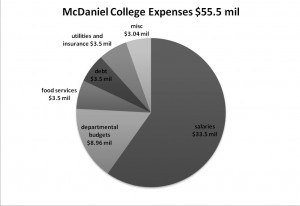Megan Robinson
Co News Editor
Earlier this semester a letter was sent home to McDaniel students informing their families of a tuition, room, and board increase of about $2,000 for the upcoming 2010-2011 school year. This increase pushes the total costs just above $40,000 per year, depending on meal plans and housing locations.
$40,000 may seem like a lot of money for students to pay, but it’s nothing compared to the operating costs of the school. The school is budgeting to spend about $56 million to operate the school next year, according to Vice President of administration and finance, Ethan Seidel.
Although the operating budget for next year is only about half a million dollars more than the current year, the college’s income has decreased. The biggest decline in income is from the State of Maryland’s educational department. Last year McDaniel received about $700,000 less than expected from the state.
The state has been substantially contributing less to McDaniel and other private colleges in the past few years. Seidel explained that “while they are cutting the funding to private institutions they are increasing or holding the line at state institutions.”
Additionally, due to the damaged economy, the college’s investments have not been growing as well as in previous years and therefore the endowment has been contributing less to the operating budget than in past years.
The college is facing more than just a decrease in funding; it’s also facing an increase in cost. Every year the college considers inflation when budgeting for the upcoming year. However, inflation is not the only rising cost. Next year’s utilities will also cost more than usual. The City of Westminster has recently expanded its water plant, which has caused a rise in the cost of water for all residents including McDaniel College.
With the increase in operating costs and the decrease in state funding, the school has decided to make up the needed funding with the tuition increase. About 77 percent of the school’s income comes from tuition, room, and board. The remainder comes from donations, the endowment, and state funding.
Some students are questioning the decision to raise tuition, given the success of the recently ended Carpe Diem campaign, which raised over $77 million, 19 percent more than its goal. However Seidel explained that the $77 million is a pledged total, and much of it hasn’t actually been received yet. Additionally, Seidel said the Carpe Diem campaign began six years ago in July 2003, and much of the money was spent as it came in.
He said that the majority of the money spent was used on physical improvements. Specifically the renovations of the Blanche Ward dormitory and Garden Apartments were partially funded by the campaign, and the additional North Village apartments, along with the some of the building costs for Academic Hall. Seidel noted that the money allowed the school to accomplish “more than I thought we’d ever be able to accomplish in that amount of time.” He then added that a smaller portion of the money was invested, and another small chunk was indeed used for operating costs.
Many students are upset about the increase. Junior Megan Roach said she found the increase “depressing,” mentioning that even small increases “add up.” Other students, however, are taking a more optimistic perspective on the increase. Junior Elyse Sparks said “We have one of the cheapest room and board prices for a private institution in the country.”
Students shouldn’t worry too much about paying for the price increase. Seidel said that the financial aid budget will be larger next year to help students pay for the increase in cost. Said Seidel, “[McDaniel] allows for the fact that if we’re going to have an increase in tuition, room, and board, then we’re going to need to have an increase in the financial aid budget.”
The school recognizes a tuition increase isn’t going to be favorable with many students. “Going up four percent doesn’t make anybody happy,” said Seidel. However the school “tried to hold the line [on cost] as much as we can,” and “increase as little as possible,” he said.




